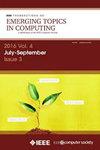通过数据库分析了解内存中的批量比特处理
IF 5.1
2区 计算机科学
Q1 COMPUTER SCIENCE, INFORMATION SYSTEMS
IEEE Transactions on Emerging Topics in Computing
Pub Date : 2023-09-19
DOI:10.1109/TETC.2023.3315189
引用次数: 0
摘要
内存中的批量位操作(PIM)是一种新兴的计算形式,它由内存阵列本身并行执行大型位操作,有望缓解内存墙问题。本文通过构建基于内存有状态逻辑的全数字系统 PIMDB,利用并专注于内存中的批量位操作,研究了批量位操作 PIM 的能力,该系统旨在加速现实生活中的工作负载:关系数据库的分析处理。我们引入了一种主机处理器编程模型,以支持虚拟内存中的批量位向 PIM,开发了高效执行内存过滤和聚合操作的技术,并将应用数据集调整到内存中。为了理解批量位向 PIM,我们将其与同一主机系统上的等效内存数据库进行了比较。我们的结果表明,bulk-bitwise PIM 大幅降低了所需内存读取操作的数量,从而将 TPC-H 筛选操作的速度提高了 1.6×-18×,将完整查询的速度提高了 56×-608×,同时将这些基准的能耗分别降低了 1.7×-18.6× 和 0.81×-12×。我们使用 gem5 全系统仿真环境进行了广泛的评估。仿真还评估了单元的耐用性,结果表明所需的耐用性在现有 RRAM 器件的耐用性范围之内。本文章由计算机程序翻译,如有差异,请以英文原文为准。
Understanding Bulk-Bitwise Processing In-Memory Through Database Analytics
Bulk-bitwise processing-in-memory (PIM), where large bitwise operations are performed in parallel by the memory array itself, is an emerging form of computation with the potential to mitigate the memory wall problem. This article examines the capabilities of bulk-bitwise PIM by constructing PIMDB, a fully-digital system based on memristive stateful logic, utilizing and focusing on in-memory bulk-bitwise operations, designed to accelerate a real-life workload: analytical processing of relational databases. We introduce a host processor programming model to support bulk-bitwise PIM in virtual memory, develop techniques to efficiently perform in-memory filtering and aggregation operations, and adapt the application data set into the memory. To understand bulk-bitwise PIM, we compare it to an equivalent in-memory database on the same host system. We show that bulk-bitwise PIM substantially lowers the number of required memory read operations, thus accelerating TPC-H filter operations by 1.6×–18× and full queries by 56×–608×, while reducing the energy consumption by 1.7×–18.6× and 0.81×–12× for these benchmarks, respectively. Our extensive evaluation uses the gem5 full-system simulation environment. The simulations also evaluate cell endurance, showing that the required endurance is within the range of existing endurance of RRAM devices.
求助全文
通过发布文献求助,成功后即可免费获取论文全文。
去求助
来源期刊

IEEE Transactions on Emerging Topics in Computing
Computer Science-Computer Science (miscellaneous)
CiteScore
12.10
自引率
5.10%
发文量
113
期刊介绍:
IEEE Transactions on Emerging Topics in Computing publishes papers on emerging aspects of computer science, computing technology, and computing applications not currently covered by other IEEE Computer Society Transactions. Some examples of emerging topics in computing include: IT for Green, Synthetic and organic computing structures and systems, Advanced analytics, Social/occupational computing, Location-based/client computer systems, Morphic computer design, Electronic game systems, & Health-care IT.
 求助内容:
求助内容: 应助结果提醒方式:
应助结果提醒方式:


